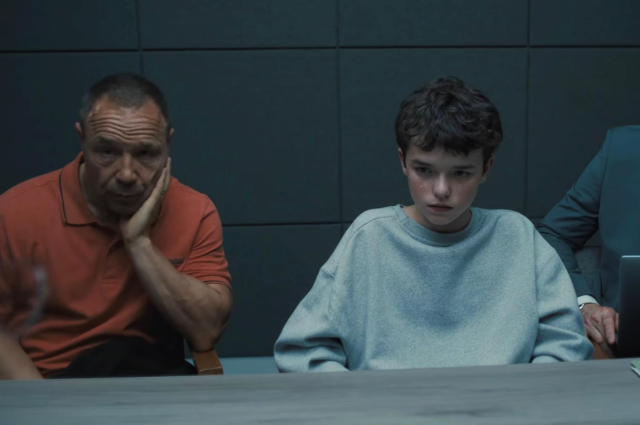Suppose you are a devoted follower of Netflix trends. In that case, you might not require an introduction to "Adolescence": The British limited series, which features a 13-year-old boy accused of the killing of a female classmate, tackles the challenging subject of how our society has conditioned young men and boys to perceive the women in their life as inferior. As of right now, Netflix's grim realism and the fact that every episode is a single scene that intensifies the sense of urgency and horror are what set it apart. At the beginning of the show, the police raid the Millers' home to seize their little son Jamie (played by Owen Cooper), while his parents (Stephen Graham and Christine Tremarco), sister, and (Amelie Pease) watch in confusion and terror, crying and pleading. There is still a misunderstanding. Even though March Adolescence is just starting, its powerful analysis of urban alienation and manhood is already paving the way for success in numerous award events.
Premise of the series
Jamie Miller, 13, is taken into custody for killing Katie, a classmate. Despite the overwhelming evidence against him, his father Eddie, mother Manda, and sister Lisa do not accept the charges. In the first scene, Jamie is hauled from his house, shoved into a waiting police van, and taken into custody. All in a single, uninterrupted take. The entire show, along with the next three, was filmed in what the business likes to call "oners." Jamie gets arrested and imprisoned for an hour since the events take place in real-time.
While each of its four episodes makes excellent use of the "oner"—the narrative is gripping, powerful, and nearly painfully tense—the tones are different. Jamie's arrest and the turmoil it causes for his family are covered in the first episode. After almost half an hour, a public defender arrives. When Jamie has his first interview, he gives his family advice on what to say and what not to say. Equipped with their proof, DS Frank (Faye Marsay) and DI Bascombe (Ashley Walters) confidently corner him to begin interrogating. Jamie's father, who believes him when he says he didn't, claims that hours ago, Jamie took Katie into a nearby park and stabbed her seven times.
Adolescence as seen through the prism of cultural misogyny's growing acceptance
Adolescence shows how easy it is for kids like Jamie, the show's protagonist (played by Owen Cooper), to become dangerous and even fatal, yet men who abuse women can be written off as evil. By connecting the global dominance of social media with the growing acceptance of cultural misogyny, it spreads a crucial lesson about their societal responsibilities. Graham and co-creator Jack Thorne were motivated by the contemporary trend of female violence in the UK and internationally, even though the story of Adolescence wasn't derived directly from the news.
Adolescence is when mystery novel readers start speculating about who the real culprit is. Rather than shutting you off, the camera chokes you into submission. The characters' adolescence appears to be a warning that they should not and cannot fool their dismal society. Teenage estrangement, bullying, and guilt were among the topics covered in Mass. The final chapter of Adolescence, which tells the whole story of that terrible night that Jamie followed Katie into the park, does the same. It ends with a sequence that will probably go down as one of the most memorable in television history.
In the second, the detectives are at Jamie's school, and in the third, Jamie and Erin Doherty, a child psychologist, engage in a two-hander that may even stand alone as a play. Again, the fourth is the most poignant with the family. Every episode is a single take that advances the plot a little bit. This never addresses what I refer to as "direct arrow psychology." A bad father is not what Eddie is. I neglected to mention that Christine Tremarco, who is not a nasty alcoholic or anything like that, is also excellent as a mother. It's not really that simple. It permits the involvement of numerous elements, such as social media and the "manosphere."
The ramifications of youthful violence and mental illness are genuine and unvarnished
Adolescence inevitably involves a disturbing exploration of a variety of topics, including mental illness, ingrate influences, emotional isolation, parenthood, teenage rage, and genetic trauma. The show's best hour and one of the most captivating television hours I've watched in a long time is the third episode, which is a two-hander that takes place seven months after the arrest. Jamie lives in a juvenile prison facility, and psychologist Erin Doherty is doing an independent evaluation for him to give to the judge at his trial. As I have seen numerous times, this session can go either way. According to one theory, she creates a range of emotions by playing him like a piano. She is a ship on his ocean; she observes his tempestuousness but does not cause it. The episode's beat is Jamie's labored breathing, and the toppled foosball table in the back corner symbolizes how Jamie's life has changed.
As the camera pans about them as they struggle and fight against each other, the doctor softly encourages Jamie to reveal more of himself, which he does—unconscious and shockingly so. For the record, this episode, like the previous three, features outstanding acting. The adolescent actor who was chosen to play Jamie, Owen Cooper, is the star of this year's finding. He may change from disdain to innocent in a matter of seconds. For better or worse, "Adolescence" makes the audience feel the same emotions as its characters: confusion, excitement, and an increasing desire to urge everyone to sit down and stop talking for five damn seconds. It exacerbates the grief, incredulity, world-shattering, resignation, and inability to understand what is taking place.

